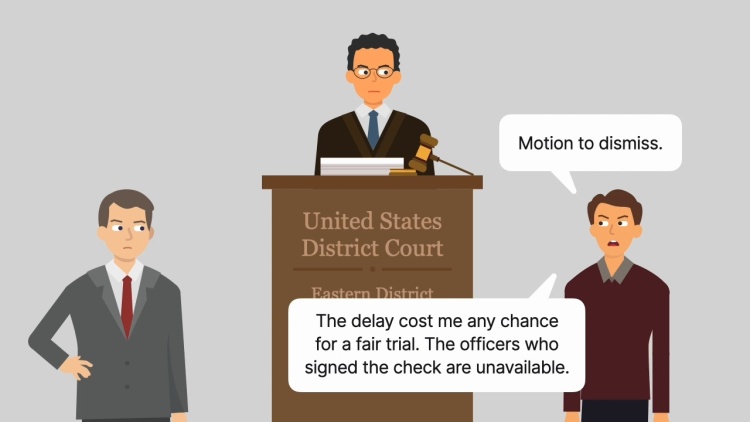United States v. Wilson
United States Supreme Court
420 U.S. 332, 95 S. Ct. 1013, 43 L. Ed. 2d 232 (1975)
- Written by Robert Cane, JD
Facts
George Wilson (defendant) was found guilty by a jury of conversion of union funds for personal use. The Federal Bureau of Investigation (FBI) had begun investigating Wilson in April 1968 for a suspected unauthorized use of union funds to pay for his daughter’s wedding via a union check in 1966. The check was signed by two officers of the union. The FBI completed its investigation in June 1970 and passed the matter along to the United States Attorney’s Office (plaintiff). The United States Attorney’s Office failed to act on the matter for 16 months until it indicted Wilson for illegal conversion of union funds three days before the statute of limitations would have run. Wilson’s pretrial motion to dismiss the indictment for unreasonable delay was denied. Wilson argued he had been denied the opportunity for a fair trial because the two union officers who signed the check were unavailable to testify. One officer had died in 1968. The other officer was terminally ill. Wilson was found guilty by a jury and filed various postverdict motions. The district court reversed its denial of Wilson’s motion to dismiss the indictment, finding that the government had unreasonably delayed in bringing Wilson’s indictment. The delay violated Wilson’s right to a fair trial because the terminally ill officer would have been available to testify regarding the check had the government not delayed. The government appealed. However, the court of appeals held that review of the district court’s postverdict ruling was barred by the Double Jeopardy Clause of the Fifth Amendment to the United States Constitution. The United States Supreme Court granted certiorari.
Rule of Law
Issue
Holding and Reasoning (Marshall, J.)
What to do next…
Here's why 907,000 law students have relied on our case briefs:
- Written by law professors and practitioners, not other law students. 47,100 briefs, keyed to 996 casebooks. Top-notch customer support.
- The right amount of information, includes the facts, issues, rule of law, holding and reasoning, and any concurrences and dissents.
- Access in your classes, works on your mobile and tablet. Massive library of related video lessons and high quality multiple-choice questions.
- Easy to use, uniform format for every case brief. Written in plain English, not in legalese. Our briefs summarize and simplify; they don’t just repeat the court’s language.





